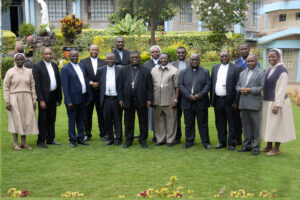KENYA: Religious Leaders Emphasize Change of Attitude Amid COVID-19 Crisis

Sr. Jecinter Antoinette Okoth, FSSA
Religious leaders drawn from various religions including Christianity, Islam and Hinduism have, in their first international virtual meeting series aimed at creating Covid-19 awareness, emphasized the need for change of attitude to help overcome the effects of the pandemic in Africa.
The initiative is a joint project of Tangaza University College (TUC) a Catholic University, Umma University (an Islamic Institution of higher learning) and Harmony Institute whose principal goal is to “promote peace in the world and contribute to a peaceful coexistence of adherents of different faiths, cultures, ethnicities and races”
The institutions further intend to reassure realization of the sustainable health systems, peace and development for Africa through collaborative partnership and faith cooperation to help achieve social transformation and improved quality of life.
“There is need for us to change our attitude. We need to cleanse ourselves from within. We must be virtuous, people of integrity. We ought to be honest and faithful. We have a lot of conflicts, noises and dissentions going on among families during this period,” Bishop Alfred Rotich of Kenya’s Kericho Catholic Diocese who was one of the panelists said during the Tuesday, July 28, virtual meeting.
“There are times we are also not taking care of young people the adolescents who are involving themselves in illicit behaviors,” the prelate continued as he underscores the need for change of attitude.
Besides, Bishop Rotich said, “It is time for people to build their spiritual life hence the need to open doors to virtuousness, to open the eyes of the heart so that we can see God in everything that we do.”
The session which was convened under the theme “Lockdown reflections on Coronavirus pandemic: what faiths advise us in difficult times of crises” focused on how to maintain the society during and after Coronavirus pandemic.”
According to the Executive Director Inter-Religious Council of Kenya (IRCK) Dr. Francis Kuria Kagema who was also on the panel, religions should inspire people and give them hope that “We shall overcome this pandemic.”
He disclosed that the drastic measures issued to curb the spread of Coronavirus in the country have affected the people and some of these measures need to be changed.
“We need to support those who have been affected in different ways due to the drastic actions put in place to prevent the spread of the virus,” said Dr. Kagema one of the Secretaries in the Inter-Faith Council constituted recently to help develop “protocols for the phased reopening of the places of worship.”
“We are advocating for change of some of these processes including burial procedures which are traumatizing to the people. These will only fuel further spread of the disease because those who are traumatized may not get the help, they need but suffer to death,” he added.
Speaking on behalf of Hindus on how to maintain the society during and after the pandemic, the National Secretary General of Hindu Council of Kenya (HCK) Ms. Sujata Kotamraju disclosed that Hindu families are traditionally joined families under one roof, where adults play a key role in molding the young ones by spending time with them, sharing stories on issues related to age and circumstances and also fixing marriages.
“These customs and traditions bring unity in the family and cohesiveness in the society, but we are facing serious crisis in the last few months since March yet what I would say to be important as at now is attitude. We need to accept, take precaution, change our attitude and move forward,” Ms. Kotamraju added.
Other members of the panel that was moderated by Prof. Macharia Munene included the Secretary General Council of Imam and Ulemas Sheikh Abdullatif Abdulkareem, Sharia Expert and lecturer Umma University Sheikh Yusuf Akasi and Editor-in –Chief of Fountain Magazine USA Mr. Hakan Yesilova.


